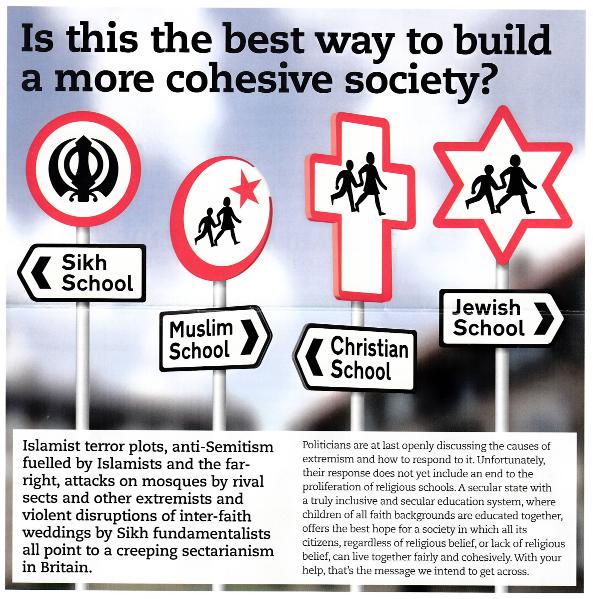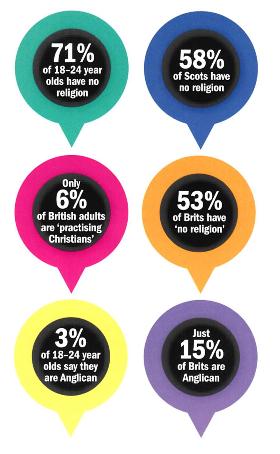|
HUMANISM |



|
North London Group |
|
Current Issues & Reports |

|
|
|
Number of non-believers in Britain rising The Times took advantage of the Christmas season to check on the current level of belief in God in Britain. It commissioned YouGov to run an online poll among a sample of 1,505 adults on 18-19 December 2016. Belief in God or a higher spiritual power was expressed by 28%, four points less than in February 2015, while avowed disbelief had risen over the same period from 33% to 38%. A further 20% believed in some sort of spiritual power but not in God, and 14% were unsure what to think. Disbelief peaked among 18-24s (46%) and men (50%). See print edition of The Times for 23rd December: http://www.thetimes.co.uk/article/belief-in-god-slumps-after-turbulent-year-mqz9i7mlh
From: http://www.brin.ac.uk/2017/counting-religion-in-britain-december-2016/ |
|
Religion and the Failure of Politics: Author: David Flint I’m a humanist and I see both politics and religion as ways in which humanity has tried to organise its collective life. Historically they are intertwined and have often supported each other. The Queen’s role as head of the Anglican Church is one small residue of this. Today we generally see them as separate though with some, often contentious, overlaps. For brevity, and knowing that I’m over-simplifying, I’ll distinguish two ways in which religion can influence politics. Firstly, religion gives people a sharp sense of compassion and motivate them to use political processes to, for instance, house the homeless, feed the starving, reform prisons and abolish slavery. I’ll call these people ‘God’s Reformers’. They have done a lot of valuable work but we should note that they have generally been a minority and have often had to fight the social conservatism of their fellow religionists. God’s reformers have become significant since The Enlightenment. Secondly, religion makes some people believe that they alone know God’s will and that everyone should be forced to do it. I’ll call them God’s stormtroopers. They have brought down governments, introduced Prohibition, persecuted witches, demolished the twin towers and created tyrannies. Today, in the UK, they resist gay marriage and the choice of an easy death in old age. They have previously resisted law reforms concerning contraception, abortion and homosexuality. (Isn’t it surprising how much they worry about sex?) Like God’s reformers, God’s stormtroopers are a minority amongst believers but it is a minority that often includes the most senior people in the ‘faith community’. They are unreasonably influential because they claim privileged knowledge of God’s will, because the state accords them special respect and because the media fail to hold them to account. God’s stormtroopers are particularly problematic in a democracy – even such a flawed one as our own. They are strongly motivated, immune to persuasion and see any compromise as betrayal. Yet caution, reasoned discussion, a willingness to be persuaded and, inevitably, a willingness to compromise are vital democratic values. And their hostility to these values is not incidental – it is fundamental. As John Knox put it “A man with God is always in the majority.” Osama bin Laden would not have disagreed. The logic of infinity – eternal life and an omnipotent God – trumps all ordinary arguments. As a humanist I welcome and honour the contribution that God’s reformers have made to public life. Humanists claim no monopoly on compassion or good sense and God’s reformers generally use arguments I understand – even when their language is religious. But I must resist the claims of God’s stormtroopers – even on those rare occasions when we finish on the same side. I resist these claims not just because they lead to oppressive conclusions but because to accept them is ultimately inconsistent with democratic politics; that is, with letting the people decide the laws that will govern them. And I believe that all democrats and liberals, of whatever party or faith, should resist them too. |
|
STEPHEN FRY ON ‘GOD’
http://www.theguardian.com/culture/2015/feb/01/stephen-fry-god-evil-maniac-irish-tv |

|
(From National Secular Society ) |
|
LINKS OF INTEREST
Casey Review: https://www.gov.uk/government/publications/the-casey-review-a-review-into-opportunity-and-integration (A long publication but the summary is worth a read!) |
|
|
|
“THINK FOR YOURSELF - ACT FOR EVERYONE” |
|
“LOVE IS WISE - HATRED IS FOOLISH” |

